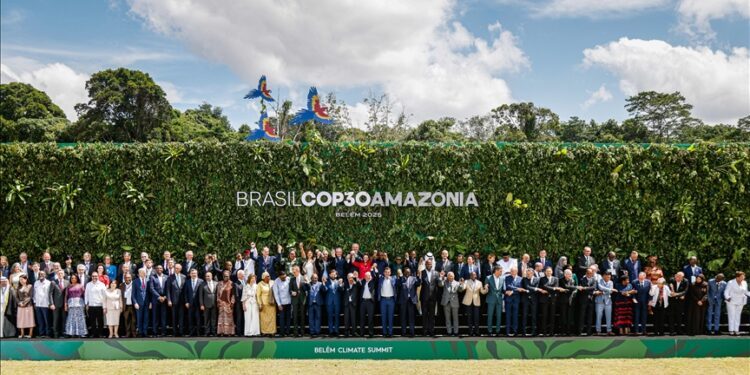- ‘If South Asia negotiates as fragmented individual emitters, it will lose; if it negotiates as a single climate-vulnerable system, it has leverage,’ says Zakir Hossain Khan, chief executive of Change Initiative think tank
- A weak outcome at COP30 would amount to ‘a denial of the natural right to survival of 2 billion people and the ecosystems sustaining them,’ says Khan
SAO PAULO
South Asia is approaching COP30 in Brazil not as a bystander but as a region already engulfed in climate crisis.
For years now, nations across the region have contended with cyclones battering coastlines, rivers breaking their banks, and intense heat waves becoming the new normal.
Despite contributing under 9% of global emissions, South Asia shoulders almost a third of global climate-related losses – including floods, droughts and cyclones that have affected some 750 million people over the past two decades, according to the World Bank.
This is happening as Asia is warming nearly twice as fast as the global average, triggering more extreme weather that has claimed tens of thousands of lives and continues to threaten millions more, the World Meteorological Organization warned in its State of the Climate in Asia 2024 report.
“South Asia is entering COP30 with glaciers retreating, deltas drowning, and heat extremes threatening 1.8 billion people,” Zakir Hossain Khan, CEO of the Change Initiative think tank, told Anadolu.
He said South Asia’s priorities are clear and pressing: fully grant-based adaptation and loss-and-damage funding, transparent and accessible finance windows for least-developed countries, and operational mechanisms like Debt-for-Nature and Climate Swaps to ease vulnerable economies out of debt.
Khan pointed to India’s role as a G20 emitter, saying the country must expand renewable capacity and push technology transfer, while the region’s Least Developed Countries like Bangladesh, Nepal, Bhutan and the Maldives require predictable, grant-based funding for adaptation and loss and damage.
“COP30 must deliver a pathway that reflects this asymmetry and anchors governance in natural right – protecting rivers, soil, and communities as living systems,” Khan said.
He stressed that adaptation cannot lag mitigation, and that climate finance must be grant-based, transparent, and accessible to the worst-affected.
At COP29 in Azerbaijan’s capital Baku, developed nations pledged $300 billion annually by 2035 for vulnerable countries, with a longer-term goal of $1.3 trillion. “The real work at COP30 is to turn that headline into architecture,” Khan said.
What are South Asia’s priorities?
From a South Asian perspective, Khan continued, three things are essential: a much higher share of non-debt-creating finance, simplified access for vulnerable countries, and mechanisms ensuring funds reach local communities rather than “dying in paperwork.”
He also asserted that South Asia must act not as fragmented states but as a unified bloc at COP30. “South Asian countries need to show up as a political bloc with a shared minimum agenda, even if they differ in other forums … They should take a joint position – regional unity is the only leverage,” he said.
“If South Asia negotiates as fragmented individual emitters, it will lose; if it negotiates as a single climate-vulnerable system, it has leverage,” Khan warned.
He cited shared ecosystems such as the Ganges-Brahmaputra-Meghna basin, the Sundarbans mangrove forest, and the Himalayas as opportunities for cooperative governance rather than geopolitical friction.
Beyond funding, Khan stressed that COP30 must advance transboundary ecosystem governance.
“South Asia needs access to technology for renewables, energy storage, grid modernization, and climate-smart agriculture. It also needs early-warning systems and data-driven planning to protect deltas, rivers, mangroves and forests as first lines of defense,” he said.
He argued for a shift in mindset: “South Asia needs to move from treating ecosystems as ‘assets to exploit’ to rights-bearing systems to partner with, where delta protection, river health and groundwater security are constitutional priorities.”
In essence, he added, climate policy must be judged not just by GDP impacts, but by “nature-justice and energy sovereignty criteria.”
Dangers of under-delivery
Khan warned that a weak outcome at COP30 could lock South Asia into a warming trajectory of 2.3C (4.14F) or higher, with catastrophic consequences.
“Regular infrastructure collapse, food and water crises, mass displacement on a scale that will overwhelm current governance systems,” he predicted.
Such an outcome, he added, would amount to “a denial of the natural right to survival of 2 billion people and the ecosystems sustaining them.”
A World Bank study estimates up to 40 million South Asians could be forced to migrate by 2050 due to climate-induced disasters.
For South Asia, this means COP30 has to be a summit that delivers real funding, technology transfer, and governance aligned with the needs of those living inside the climate crisis, not simply preparing for one.
“A weak COP30 doesn’t just slow climate progress for South Asia – it hard-codes inequality and insecurity into the region’s future,” Khan said.
“For us, climate ambition is not a diplomatic preference; it’s a survival requirement.”






